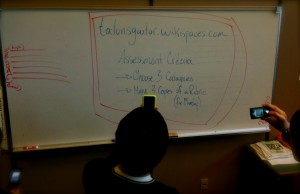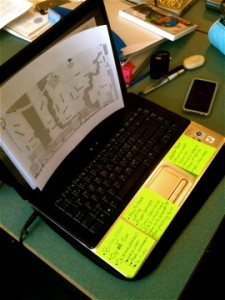As even the devil might need an advocate from time to time, I thought I’d offer a few points in support of delaying the rounding up of the school’s cell phones and putting the kids who use them in camps where they might better concentrate. An unfortunate wordplay that evokes a similar (if heavy-handed) connotation of totalitarianism run amok as in the oft-cited observation, the only institutions who ban cellphones are the Taliban and highschools .
While they may present a different set of challenges for today’s educators, cell phones and mobile devices are a part of the world we live in, and should be a part of the education we provide today’s students.
Cell phones are distracting. They can isolate people, be used to bully, gossip, buy or sell drugs, commit other crimes, prorogue Parliament, call in bomb threats, cheat on tests, procrastinate, plan the next 9/11, etc etc etc. There are plenty of reasons for teachers to be leery of such technology coming through their doors, being used under their classroom desks, or being flipped open anytime one of their students is in “the bathroom.” As well, in training our students to enter the workforce we will do them many favours by instilling in them the ability to discern between times when it is appropriate to be engaged with personal technology, and when it is not. I certainly don’t want the fine people who pump my gas, serve my fries, and are otherwise working for (or with) me in the face-to-face capacity of many service sector jobs using a cellular or smart phone while they’re at work. If I ran a factory, hired manual labour, or even dealt in certain collaborative fields (business, creative arts, think tanks, etc), I might be so inclined as to institute a no-cell phone rule, as they would likely impede the nature of the work my colleagues or employees are engaged in.
TALONS consult with local blogger Amber StrocelBut even then, there would likely be exceptions, and if I wanted to be a co-operative boss rather than a prison warden, I probably wouldn’t make my employees empty their pockets before they came in to start the day, and it will be a while before I do the same to my students – TALONS, guitar, or otherwise. But that may be me; I realize that I might be in the minority. But I would also be interested in establishing a school learning community that values face-to-face dialogue, debate, and experiential, first-hand learning for students and teachers alike. If we are to ask that our students are committed to the present moment of their current learning, why shouldn’t we expect the same of one another?
In fact, I suggest that if we’re philosophically against the ills that our mobile devices provide the educational landscape, I would await the outcry that would ensue if our administrators collected our phones, laptops, tablets, and other technologies that distract us every morning, things that get in the way of our more personal human interactions, and that make “cheating” (emailing resources, helpful material and maybe even email threads like this one to one another) all too easy. If the school is a no cell phone zone, it should be a no cell phone zone for all; otherwise, the logic of a school wide ban for Students Only doesn’t add up for me.
If the ban is only going to apply to students, the more moderate approach of a classroom-by-classroom basis, allowing each teacher their own classroom management strategy, is far-better suited to the central beliefs of a profession based in the diverse subjectivity of human experience. Personally, I can say that banning cell phones at our school would unequivocally make me, my students, and my classroom(s) less productive.
My cell phone is how I check my email, maintain a calendar, record student presentations, skits, and songs, take pictures and movies, as well as play music, videos, and podcasts. My phone is my primary connection to Google, Wikipedia, major newspapers and blogs, as well as a global network of educators, researchers and thinkers that share their wisdom, learning, resources, and classrooms with me and my classes in kind. I try to model optimal, yet responsible use of my personal technology, and I expect the same of my students. In turn their phones allow handheld access to more useful and current information than is in our textbooks (blasphemy!), communicate with one another, seek input from peers who may be elsewhere at the time (home sick, appointments, family vacations, on off-block, etc), consult expert authorities on subjects we study, and record speeches, songs, videos, podcasts, and material to study later (lectures, debate, conversation), in addition to viewing, reading, or listening to supplemental material from numerous sources to support what we are learning about in class.
By no stretch am I saying that this is how your classroom should look, feel, operate or anything else; how you teach your learning outcomes is your practice – this is mine (though granted, as a language arts and history teacher, the ability to communicate and decode text-based information is central to learning outcomes in both curricula and inherently involves more of the sorts of things PODs make possible). Ban cell phones, laptops, carrier pigeons, calculators, GPS, pens, smoke signals or anything else you think takes the focus away from your lessons. But my classroom would suffer if you would have your values imposed on it, just as yours would likely suffer if the reverse were true.
I am also, while I’m at it, not advocating for any sort of laissez-faire, anything goes policy toward my own or my students’ mobile devices in class. Q and I lectured and facilitated classroom discussions for more than two consecutive hours today, and only saw one cell phone the entire time. We don’t allow iPods, cell phones, watches or any digital technology other than cameras on our (single or multi-day) field trips. During these times when our priorities are to be engaged with one another and our environment, it is made clear that these devices serve no worthwhile purpose other than to detract from meaningful present experience. I think it is important to stress the value in “unplugging” to our students – and remember it ourselves – as a means of maintaining a sense of attention literacy in an increasingly busy information landscape.
But there are countless other times when cell phones are an invaluable, free resource in which our classrooms, offices and the rest of the developed world are suffused. When looked at as an opportunity, rather than a threat, modern mobile devices offer possibilities for student engagement, collaboration, and learning that are staggering.
Each of the classes we teach can reasonably expect to contain nearly a class-set of the following, at no cost to us, the school, district or Ministry of Education: video and still-cameras, mp3 recorders, internet browsers (that open, load and surf faster than many of our school computers), communicative networksthat involve 99% of our school community and well-beyond its walls, personal calendars, organizers, note-takers, tutors, tutorials, stopwatches, calculators, RSS readers, image and video-editors, as well as instantaneous communication (Facebook, Twitter, email) that is the hallmark of a burgeoning Information Age.
Being able to use these technologies may not be appreciated by service-oriented employers whose workers are paid by the hour, but they are already workplace essentials in many sectors, as it is seemingly impossible to find professions within an information-based economy where the leveraging of the internet, mobiles, laptops, and social networks is not a basic requirement.
To neglect this fact would be irresponsible if we believe our jobs hinge upon preparing tomorrow’s workforce.
Kids texting while a teacher is talking, or while the class is supposed to be working, is an issue of manners, or alternatively one of classroom management, and we are free to teach either of these in any number of ways that doesn’t involve our school making cell phones illegal (unless, like I say, we go full-bore – I’d be into that experiment).
It never worked for prohibiting alcohol, censoring free speech, implementing abstinence education, or waging a War on Drugs.
Why would it work for cell phones?
I only offer my thoughts as respectful counterpoint to a wave of emails that seemed to slant toward a “Get rid of ’em!” approach that would impede the great learning I see these devices enable every day. It’s not a matter of better or worse; the way each of us teaches with respect to these devices is merely different.
A final realtime example: I posted on Twitter (from my phone) that I had received emails from multiple colleagues cheering for the banning of mobiles at our school, and asked my assembled network for links to resources discussing the advent of hand held technologies in the modern classroom. Within a few hours, I had several responses (including a few from current or former students at our school) that shared insights like recent grad Kassie Wasstrom’s (and were likely typed out by thumb on a phone’s keypad or touchscreen):
“We need to focus on the positives. I have a couple of profs that encourage us to bring iPods, iPhones, etc, because they help stimulate conversation.”
Errin Gergory, a teacher from school district 74 in Northern BC, sent me links to the following interviews with SD43 teacher Sonya Woloshen (supplied via Coquitlam teacher and principal (currently residing in China) Dave Truss‘ youtube channel):
- PODs (Personally Owned Devices) in the Classroom
- Expectations and Attitudes
- Wireless, Filters and Policies
I also received a link to this exhaustive debate of the pro’s and con’s for either banning outright or promoting responsible use of mobile devices from one of my current students, as well as a link to a TED Talk I blogged about last January, Stefana Broadbent’s Democratization of Intimacy:
At the end of that post, I think I manage to sum my thoughts up better than I have here:
“It is not a matter of banning cell phones, or even giving them a constant working purpose in our classrooms (such that they are not idle and hence a distraction, or even to meet students “on their turf”), but rather, a focus on raising learners – and to continue in Broadbent’s vain: citizens – that exist within the emerging fluidity of the 24/7 social media cycle, and yet are empowered by its capabilities to unite, and connect, rather than cowed by its vapid and addictive lesser qualities.”





This is probably one of the best analyses of this issue that I have read. I am in the process of reviewing our admin procedures. The District will be providing some guidance around digital responsibility that will include some direction for schools around devices. I will reference this post as we work through this at the District level.
Thanks for sharing this perspective.
Many thanks for the encouragement, Brian. My reply email snowballed into something I thought deserved some focus – and pictures! Glad I decided to post it outside (solely) the staff email system. Cheers, Bryan
What a terrific post! Right now I am trying to convince our district office and my staff that we need to teach students how to learn with their cellphones and pda’s, not ban them. I firmly believe that a district can spend millions of dollars on technology that will quickly be out of date, or leverage the existing technology in the hands of students that will be updated as frequently as the latest trends in clothing.
You have hit the nail on the head with this, and I have already forwarded this to our district office. Well done!
Thanks for this thoughtful and layered perspective on PODs in the classroom. Your essay resonates with me with several levels, the respect it advocates for the learner and the learner environment for one. Rather than engaging students in discourse where they are invited to formulate, articulate, listen to varied perspectives and perhaps change their behaviour through understanding, an all out ban simply terminates and ignores. Frankly, the image of the “No Cell Phones! with a big red X through the cheap graphic scared the knees from my bees. This type of heavy-handed hegemony does not belong in a place of learning/understanding. I also appreciate the respect you demonstrate for the plurality of our classrooms and disciplines. Is this debate about control or is it about learning?
Cindy, Cale,
Thanks for the comments – I think you both add compelling analogies to the argument:
The idea of “leverag[ing] the existing technology in the hands of students that will be updated as frequently as the latest trends in clothing” is apt – so many technology initiatives, when focused on hardware before pedagogy and learning, are ornamental and miss the point that the technologies schools traditionally oppose have become the apparatus of modern communication. To oppose this reality, I agree with Cindy, is a “type of heavy-handed hegemony [that] does not belong in a place of learning/understanding.”
Some wonderful insight, Brian…I think what resonates most with me is your line (okay, more than A LINE) stating “Ban cell phones, laptops, carrier pigeons, calculators, GPS, pens, smoke signals or anything else you think takes the focus away from your lessons. But my classroom would suffer if you would have your values imposed on it, just as yours would likely suffer if the reverse were true.” Essentially, to each his own. We (educators) always fight vehemently for our classroom autonomy, and this issue clearly waves that banner.
PS: As much as I hate seeing kids using their phones inappropriately during class, I can’t help but laugh when students ask if I ever see teachers using them during staff meetings, pro-d days, etc…some of these kids are pretty wise to our ways!
Thank you, Bryan, for the thought and effort you’ve put into sharing your perspective on this seemingly hot button issue. Although I certainly support the need for regular ‘unplugged’ time, I also see the vast potential of these devices as learning tools. I believe the frustrations we deal with around this technology are more related to classroom management (and indeed, as you state, student manners) than education. I personally find it more frustrating and time consuming to try to manage an outright ban than it is to set acceptable parameters of usage and related consequences for my classroom situation.
Hey Mr.Jackson, I, being one of you students, completely agree with what you are saying. Our classroom lends itself mostly to good development of learning precisely because of the wealth of tools we can use to access information. Of course, they can and will cause distractions, but texting a friend during class, so long as it is not obsessive, has never hurt anybody, and matters little when the same machines are also being used to improve work to a great degree. In most of my non-Talons classrooms, the work that makes people learn the most is done at home, because the tools needed – internet, computer, even the sorts of things now found on phones – are inaccessible at school. I’ll save some things for my post about this, but I really agree with what you are saying about there needing to be some understanding of appropriateness. If students can understand that, I think technology will find its way into all classrooms, and I eagerly await the day.
Jodey, Mike, Thanks for the kind words!
To have written this post in response to a wave of oppositional views, it’s affirming to see other colleagues voice their support, here and in email (most folks didn’t venture to comment ‘publically’ – way to step out there!).
And Liam,
I think your input lends even more clout to the argument that teachers should look to confront the realities of these devices’ presence in their classrooms, provided they don’t become “obsessive.” I would tend to agree – and many teachers’ behaviour at staff meetings and pro-d events would attest their agreement – that “texting a friend during class has never hurt anybody… and matters little when the same machines are also being used to improve work to a great degree.” Teachers hearing that “the work that makes people learn the most is done at home,” is particularly critical of the shortcomings of the modern classroom.
I look forward to seeing you putting some thoughts on the issue together in a blog post.
One of the best articles I’ve read on the issue. It is very clear that as educators we need to embrace the technology students bring to class. Mobile devices, iTouch, iPads or Laptops all should be utilized as a potential means to get feedback, engage and test the students. Check out http://www.tophatmonocle.com – It is a new generation of technology that functions as a more comprehensive version of “clickers” and uses devices that are either WiFi or mobile enabled.
What an article! Your points are excellent and you hold a valid argument throughout the entire post by seeing both sides. …I love the picture of your students taking a picture of their homework… how many times I have asked my students to get their assignment notebooks out, which end up being either lost or not filled out, but they do have their cell phone in their pockets! I hope to bypass some roadblocks and incorporate this into my room, thanks!